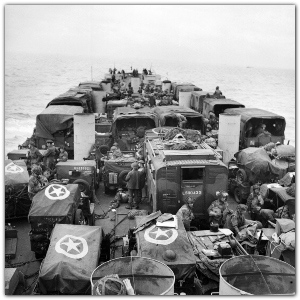
Social History Talks – Spring Series
This year the country commemorates the 80th anniversary of the Normandy Landings on 6 June 1944. To remember those who served in the Second World War, this quarter our Spring series is focused on the background and build-up to D-Day. It has a slightly different format to previous talk series with two rather than three Zoom talks. This all series ticket covers both of the talks in the Spring “Social History” talks series, for the discounted price of £8 (members £7). You may also book each talk individually – see each separate event pages. Both talks are on Thursdays at 2pm and last about an hour. Afterwards there will be time for questions and discussion. This is an online talks series using Zoom.
The online talk series is followed by a separate but associated face-to-face special event on Thursday 27 June (to be booked and paid for separately – £12). As our special D-Day event it begins with a fish and chips lunch after which we will have a D-Day talk with Q&A afterwards.
Thursday 25 April 2024 “The British Army in World War Two” with Richard Marks
The personnel of the British Army served across the globe during World War Two, from Iceland to Australia, from the Falklands to East Russia. The army grew from the small peacetime force that went to war in 1939 to the huge modern force that Britain had at its disposal by the latter stages of the war. This talk explores how the army was structured and what it was like to be in the service. The women’s forces supported the army – but in what ways and where did they serve? How was the army equipped and how did this change during the war? Why was the British Army actually more mechanised than the vaunted German army of 1940 and what did that mean to every soldier? Find out more in this talk.
Thursday 23 May 2024 “The Technology of D-Day” with Richard Marks
The large raid on Dieppe in August 1942 was a complete failure. However, it provided important lessons to the allies which, complimented by experiences of landings in North Africa during Operation Torch, made the D-Day Landings in 1944 a success. One of the key lessons learned was that special equipment and new tactics were needed to successfully mount an invasion. The technology of D-Day resulted from those lessons. But what did miniature submarines and divers have to do with the D-Day landings? What was a Bobbin or a Crab, and why did the Royal Engineers have their own special tanks? How did the allies control the beaches once troops were landing and how did they deal with the formidable German defences? What new medical provision was provided? How did this effect those that fought? Find out about all this and more in the Technology of D-Day.
Zoom Talk Requirements
To join these talks, you will need a computer device with speakers. Ideally, also a webcam and microphone. You also need to be able to access the internet from it. First-time users of Zoom, will need to download a small piece of software – included in the link.
How to Book
Pre-booking is required because places are limited. Full joining instructions will be emailed to attendees in advance. Bookings close one day before the first event.
To book – scroll down.
Image: Knight (Capt), No 5 Army Film & Photographic Unit, Public domain, via Wikimedia Commons (cropped)
Speaker
-
 Dr Richard Marks
Dr Richard MarksRichard is a published historian based in Berkshire who specialises in industrial, military, and railway history and also the history of science. His current areas of research are industrial development in the Victorian period, the development of the railway and canal systems in Britain in the mid to late 19th Century and the history of British Rail. He has a PhD in economic history. Richard’s book about British Rail Engineering was published by Pen and Sword in early 2024 and a new book is due out later in 2024 about the Wantage Tramway Company.
